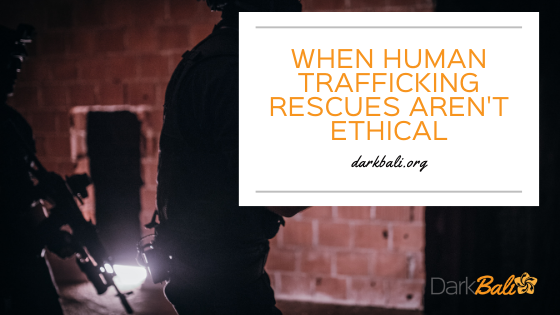“[O]rganisations meaning to help often do not have the experience or expertise to identify whether people have actually been trafficked, and they rarely have the capacity or expertise required to offer high-quality legal and social services to those who have been trafficked or who were caught in a raid.”
Hollywood is full of movies about captured kids with determined parents and friends breaking down doors to rescue them from human trafficking. Sometimes organizations capitalize on this (mis)conception of anti-trafficking work by creating teams of investigators that enter another country, find people who appear to be trafficked, and perform rescue missions. These raids are often accompanied by videos capturing one of the most traumatic experiences of the survivors’ lives in order to celebrate the mission’s success and raise money for the next mission.
But is this appropriate anti-trafficking intervention?
To determine this accurately, we have to answer two questions:
- Are rescue missions trauma-informed and survivor centered?
- Do they effectively combat human trafficking?
We honor our history even while we insist on learning from mistakes and changing our methodology when necessary. The modern anti-slavery movement started with these kinds of international rescue missions, and we can be proud of those days for what they were. They were the beginning of an important movement, and we stand on their shoulders as we move forward. However, what we know now from survivors is that raids and rescue missions cause harm to those “rescued.” It is incredibly traumatic to have a team of armed people swoop in unannounced – especially when you are already living in fear. Adding additional trauma to human trafficking survivors’ experience should be avoided whenever possible. Through research and trial and error, we are finding that there are often more effective ways than a raid to get people out of trafficking situations that do not result in added trauma to survivors.
In addition to ensuring our actions are as safe as possible for victims, we must analyze the efficacy of international rescue missions. Put simply, when these rescue missions are not done under the authority of local law enforcement, they actually lead to MORE trafficking. Human traffickers see their victims as products. If a “product” is stolen, it is easy enough to just get another one to take its place. So, a rescue mission that is not accompanied by arrests and prosecutions of traffickers has essentially made a vacuum for a new victim to take the place of the one rescued.
While rescues or raids may still be necessary in some cases (though current research suggests that they should always be a last resort), they should always be performed under the leadership and authority of local law enforcement. International organizations do not have the right or authority to act as law enforcement in another country, though they may be invited to consult and assist in an investigation. When organizations work outside of their scope of authority, they interrupt that country’s criminal justice system, undermine local leadership, and often cannot ensure effective aftercare because they have no legal authority to refer to victim services. And ultimately, they create the pathway for new victims because the traffickers continue to exploit people with impunity.
We know that one of the most effective strategies for ending human trafficking is increasing the risk of engaging in this criminal activity by arresting and prosecuting traffickers. Rather than undermining criminal justice systems, advocates can help it by supporting police, prosecutors, and judges and lobbying for stricter laws within the country.
In Indonesia, the law enforcement units in charge of investigating human trafficking are very small and underfunded. From the outside, they sometimes look ineffective, but in reality many of them do amazing work with very few resources. Our goal is to strengthen and equip ALL of those on the frontlines of human trafficking which includes those working in Indonesia’s criminal justice system. We facilitate professional workshops for police officers and work to develop healthy collaboration between law enforcement and victim service providers. To help support Indonesian law enforcement, you can join our Impact Team.






